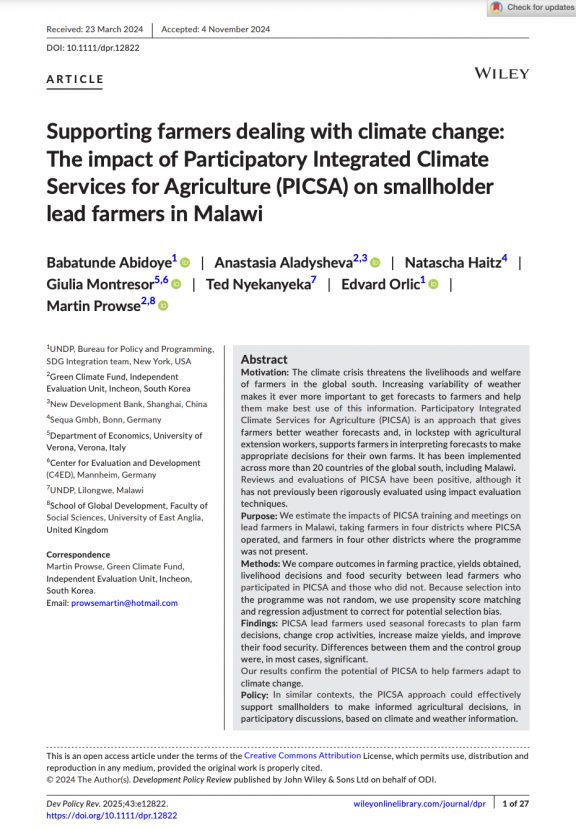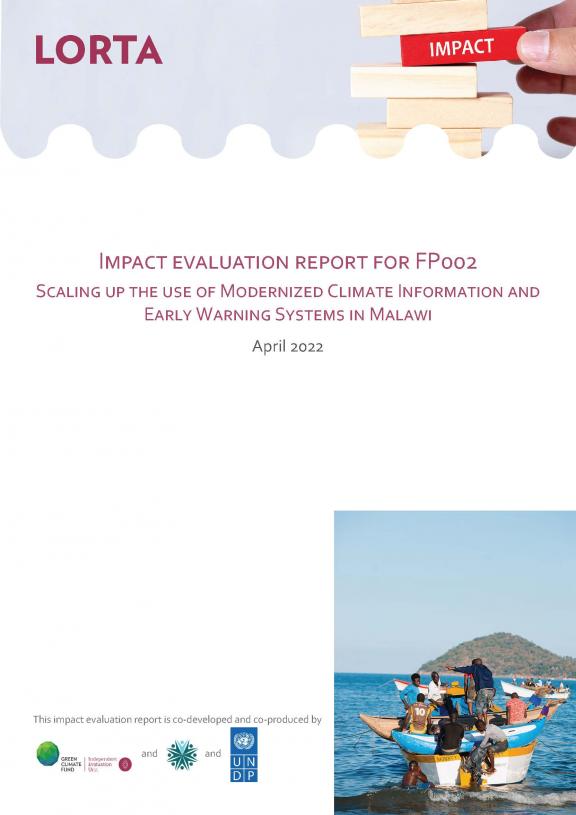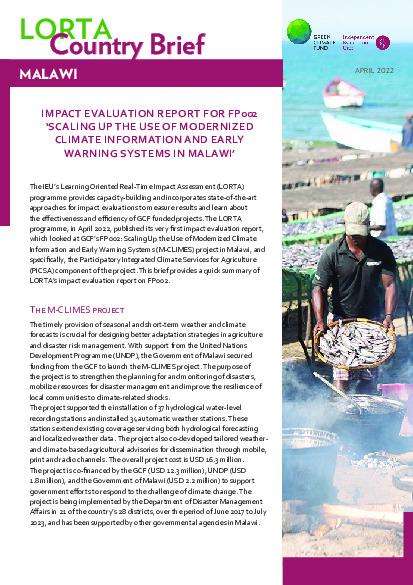FP002
Scaling up the Use of Modernized Climate Information and Early Warning Systems in Malawi
Scaling up the Use of Modernized Climate Information and Early Warning Systems in Malawi
Climate Information & Early Warning Systems: Impact evaluation of the Participatory Integrated Climate Services for Agriculture (PICSA) intervention, a crucial element of GCF-funded project FP002. It is administered by United Nations Development Programme (UNDP) and collaborating partners in Malawi and focuses on climate information and early warning systems. The primary objective of this initiative is to expand the adoption of modernized early warning systems and climate information, thereby improving the well-being and livelihoods of vulnerable communities across multiple districts in Malawi.
-
TopicAgriculture & adaptive livelihoods
Early warning system (EWS) & climate information services
-
Project componentParticipatory Integrated Climate Services for Agriculture (PICSA)
-
Impact evaluation designPropensity Score Matching (PSM)
-
Target beneficiariesFemales make up 50% of the 3,000,000 direct beneficiaries | Impact evaluation sample: 397 farmer households
Timeline
Onboarded to LORTA
Aug 2018
Baseline data collected
Oct 2018
Baseline report published
Jan 2019
Endline data collected
Oct 2020
Endline report published
May 2022
One region
- Africa
One country
- Malawi
Reports

Supporting farmers dealing with climate change: The impact of Participatory Integrated Climate Services for Agriculture (PICSA) on smallholder lead farmers in Malawi
02 Jan 2025
This document explores the impact of Participatory Integrated Climate Services for Agriculture (PICSA) on lead farmers in Malawi, addressing how this innovative approach equips smallholders to adapt to the challenges of climate change. PICSA integrates localized weather forecasts with farmer training and participatory decision-making to optimize agricultural outcomes. By comparing lead farmers who participated in PICSA with those who did not, the study reveals significant improvements in farming practices, maize yields, and food security.

Impact Evaluation Report for FP002 : Scaling up the Use of Modernized Climate Information and Early Warning Systems in Malawi
20 May 2022
This report assesses the impact of the Green Climate Fund's FP002 "Scaling up the Use of Modernized Climate Information and Early Warning Systems in Malawi". The impact evaluation focuses on the Participatory Integrated Climate Services for Agriculture (PICSA) component of the projects and its impact on the climate resilience of farmers supported within FP002.
Impact
LORTA’s work finds significant impacts on both intermediate and long-term outcomes. The positive evidence reported on the use of seasonal forecasts, changes to crop activities and yields, and income is in line with benefits reported by lead farmers who attended the PICSA training within the Modernized Climate Information and Early Warning Systems (M-CLIMES) project during the 2019 performance monitoring assessments.
For more details, read the full report here.
- PICSA lead farmers are much more likely to use seasonal forecasts to plan farm decisions and are more likely to make crop variety decisions.
- The likelihood that PICSA lead farmers will make changes in crop activities is double that of non-PICSA farmers.
- The report does not find statistically significant effects on the number of crops grown or on the likelihood to make changes to livestock activities (at least, not systematically).
For more details, read the full report here.
- PICSA lead farmers register more than 434 to 505 kg/ha in annual maize yields when compared to their peers in the control group. This represents a 60 per cent increase in yields compared to the control group.
- PICSA lead farmers are less likely to work on other farms as a secondary source of income.
- The report does not find significant impacts on food security as measured by food expenditures or the subjective measure of worrying about food shortage during the past 30 days.
For more details, read the full report here.
Impact stories
![]()
Co-creating an evaluation design: Insights from the field
15 Mar 2019 / Early in 2017, the IEU kick-started its LORTA Programme with a workshop in Bangkok where entities and agencies implementing 15 GCF-approved projects were invited to learn about impact evaluation and constructing evaluation designs.
In September, I had the privilege of travelling to Malawi and participating in the scoping mission for one of those projects -- Project FP002: Scaling up Modernized Climate Information and Early Warning Systems to Save Lives and Protect Agriculture in Malawi (M-CLIMES).

Co-creating an evaluation design: Insights from the field
15 Mar 2019 / Early in 2017, the IEU kick-started its LORTA Programme with a workshop in Bangkok where entities and agencies implementing 15 GCF-approved projects were invited to learn about impact evaluation and constructing evaluation designs. In September, I had the privilege of travelling to Malawi and participating in the scoping mission for one of those projects -- Project FP002: Scaling up Modernized Climate Information and Early Warning Systems to Save Lives and Protect Agriculture in Malawi (M-CLIMES).
Details
The timely provision of seasonal and short-term weather and climate forecasts is crucial for designing better adaptation strategies in agriculture and disaster risk management. With support from the UNDP, the Government of Malawi secured funding from the GCF to launch the Modernized Climate Information and Early Warning Systems (M-CLIMES) project. The purpose of the project is to strengthen the planning for and monitoring of disasters, mobilize resources for disaster management and improve the resilience of local communities to climate-related shocks.
In Malawi, the PICSA approach involved the Department of Agricultural Extension Services in partnership with the National Smallholder Farmers Association of Malawi. They conduct training sessions with groups of lead farmers ahead of the agricultural season to analyse historical climate information and use participatory tools to develop and choose crop, livestock and livelihood options.
